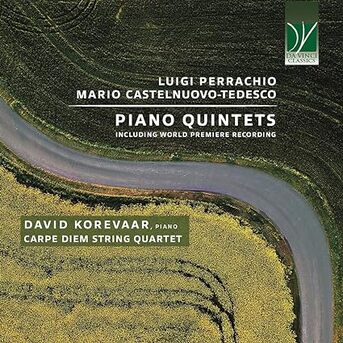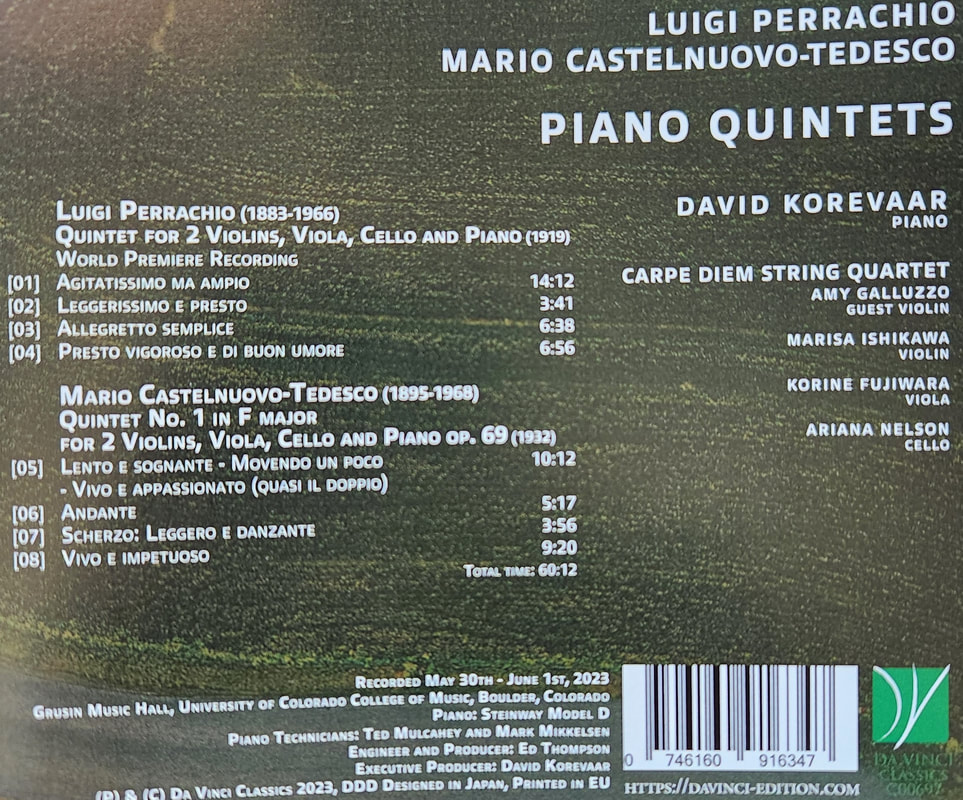Glorious music gloriously played by pianist David Korevaar and the Carpe Diem String Quartet1/19/2024 This is a somewhat difficult recording to write about, simply because the music is so original and innovative, and yet...not new, I’ve never heard anything quite like it. Written in 1919 and 1932 respectively, I would have expected to hear rather traditional Romanticism influenced by 20th-Century Impressionism. And yes there is that. But at the same time, it’s so fresh, modern and forward-looking, I wouldn’t have been surprised to learn this music was written much later.
Luigi Perrachio’s Piano Quintet, composed in 1919, was so pioneering for its time, it’s incomprehensible it has been forgotten for over 100 years. In 2019, pianist David Korevaar discovered its manuscript and presided over its eventual publication in 2022. This CD represents its world premiere recording. And what an incredible discovery it is. But, I’ll get to that in a moment. I actually started listening to the companion work on this CD, from the more familiar composer Mario Castelnuovo-Tedesco. I have several CDs of Tedesco’s music on the Naxos label, which has championed the composer's music over the past decade. More recently, Da Vinci Classics has begun a series of new recordings of their own. Tedesco wrote a lot of piano and guitar music - solo pieces, chamber music and even concertos - much of which can be found on both labels. Naxos has also released two CDs of his orchestral music, “Shakespeare Overtures”, as well as a disc of his two Violin Concertos. While I always enjoy his music every time I encounter it, it is his chamber music which appeals most. His popular Guitar Quintet is glorious for sure, and it has been fortunate to receive several excellent recordings during the past decade. And now from Da Vinci Classics comes what must be considered one of his preeminent masterpieces - his rarely recorded 1st Piano Quintet. It has been recorded before: the premier recording appeared on a 2006 Albany Records CD, and a 2016 CPO release gave us both piano quintets. Unbelievably, I do not find either of these CDs on my shelves and regret not having heard them. And even more unbelievably, the CPO CD is no longer available, relegated to the digital-download-only format, making this new recording of the 1st especially treasurable. The first movement is free-flowing, rhapsodic and dramatic, complete with occasional fanfares as if proclaiming a call to action. There are passionate string lines soaring over rich, chordal piano writing, with boundless chromatic and harmonic freedom. The music is so varied and freely episodic it sounds almost improvisational. The Andante continues this rhapsodic outpouring with strong hints of Ravel’s Piano Trio, followed by a waltz-like Scherzo which is just quirky enough to be delightful, if not elegant. And the finale is positively orchestral in scope and orchestration; it’s difficult to believe this music is played by just 5 musicians. Tedesco’s Jewish heritage makes a strong appearance here, especially in the second subject, where the 1st violin is given prominence with distinctive, idiomatic melodies. All through the piece, I was captivated by the ensemble playing. I was particularly impressed with the size, breadth and amplitude of the piano contribution. And in response, the string quartet actually has to work at asserting their importance. The result is a certain muscular intensity to their playing which makes this music so thoroughly engaging. They certainly bring the inherent Italianate passion to the fore. Incidentally, I heard this same passionate playing on their earlier recordings of Jonathan Leshnoff’s wonderful String Quartets (#1 on Naxos, and #3 & 4 on MSR Classics) - although, curiously, only the original violist, Korine Fujiwara, remains a current member of the group (and a former violinist joins as a guest on this recording). Going back now to the premier recording of Perrachio’s Quintet, I was surprised to hear the opening movement instantly sounding rather more contemporary - even more harmonically adventurous, even more freely structured and improvisational. This despite it being composed 13 years before the Tedesco. The first movement is expansive (lasting nearly 15 minutes), with lots of passionate melodic themes played by the strings in unison over big, powerful piano writing. But there’s also some unexpected intimacy too, in the central section for example, with some delectable, transparent string scoring. Debussy and Ravel influences are heard everywhere in this music, but with Perrachio’s Italian distinction predominating. A short Scherzo follows, playful and quirky, with some imaginative scoring for pizzicato strings conversing with staccato piano tinkling. The Allegretto is pastoral in nature, simpler and more singing, while the finale is vigorous (as indicated) but not as passionate or intense as the opening Agitato. It is driven by a dance-like fleetness, often propelled forward by heavier marching rhythms, but never becoming ponderous. The playing is beyond reproach and this music could not possibly receive stronger advocates. The recording quality is very good too, if not quite state-of-the-art. The acoustic is warm but perhaps just a bit confined, slightly enhancing the group's imposing nature. But their awesome dynamic range is splendidly portrayed, from delicate softs to towering louds, and the fullness to the strings suits this music perfectly. This recording is a major accomplishment for David Korevaar and this CD is an important and indispensable release. The Tedesco itself is worth the cost of the disc, and with the inclusion of the Perrachio, it is invaluable. I implore Mr. Korevaar to consider recording Tedesco’s 2nd Quintet as well in the near future, especially since I can find no other recording of it currently available.
0 Comments
Leave a Reply. |
Proudly powered by Weebly


 RSS Feed
RSS Feed